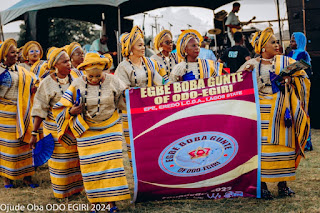THE INAUGURAL OJUDE OBA OF ODO-EGIRI KINGDOM, EPE: A COLORFUL CELEBRATION OF CULTURAL AND TRADITIONAL HERITAGE
By: Jubri Idris Epe-CityJnr
The first Ojude Oba festival of Odo-Egiri Kingdom stands as a milestone in the history of our cultural and traditional heritage. This vibrant and colorful event not only revived and celebrated our rich traditions but also laid the groundwork for an enduring annual festival that continues to unite and inspire our community.
Revitalizing Cultural Practices
The inaugural Ojude Oba was a spectacular showcase of the diverse cultural practices of Odo-Egiri. Traditional dances, music, and ceremonies, which had been handed down through generations, were brought to life in a grand display. The festival featured age-old regberegbe performances, each group adorned in distinct and colorful attire, performing dances and rituals that highlighted their unique histories and contributions to the kingdom. This revival of traditional practices was crucial in preserving our cultural identity.
Strengthening Community Unity
The first Ojude Oba played a pivotal role in strengthening the bonds within the Odo-Egiri community. It was a time when people from all walks of life, both young and old, gathered to celebrate their shared heritage. The festival fostered a sense of unity and pride, reminding everyone of their collective identity and cultural roots. The vibrant parade of regberegbe groups, each showcasing their colorful costumes and synchronized movements, was a testament to the community's unity and cohesion.
Honoring Traditional Leadership
A key feature of the first Ojude Oba was the homage paid to the HRM. Oba Musiliu Abiola Oliwo (Gbadewolu 1), the traditional ruler of Odo-Egiri Kingdom. The festival underscored the Oba’s role as the guardian of cultural heritage and a symbol of unity. The Oba’s royal procession, adorned in regal and colorful attire, was a highlight of the festival, drawing admiration and respect from all attendees. This celebration of traditional leadership reinforced the importance of the monarchy in preserving cultural and societal values.
Showcasing Indigenous Arts and Crafts
The festival also served as a vibrant market for indigenous arts and crafts. Local artisans had the opportunity to display their exquisite creations, from intricately woven fabrics and beadwork to handcrafted carvings. The colorful stalls and displays added to the festival's visual splendor, attracting visitors and promoting the appreciation of traditional arts. This platform not only helped preserve these crafts but also provided economic support to the artisans, ensuring the continuation of these skills.
Educational Impact
The inaugural Ojude Oba was an educational spectacle for the younger generation. It provided a vivid and immersive experience of the kingdom’s traditions and history. Elders narrated stories and explained the significance of various cultural practices, ensuring that the knowledge was passed down. The colorful displays and performances made learning about the past engaging and memorable for the youth.
Economic Boost
The first Ojude Oba also brought significant economic benefits to the Odo-Egiri Kingdom. The influx of visitors spurred local businesses, from food vendors to accommodation providers. The colorful and lively atmosphere attracted tourists and dignitaries, creating opportunities for local commerce to thrive. The economic upliftment was a tangible benefit that encouraged the continuation of the festival.
Setting a Vibrant Precedent
The first Ojude Oba set a vibrant precedent for future celebrations. Its success in reviving cultural practices, uniting the community, and promoting traditional arts established it as a cornerstone of Odo-Egiri’s cultural calendar. The colorful and joyous nature of the festival has ensured its place as an eagerly anticipated annual event that continues to celebrate and preserve the kingdom’s rich heritage.
Conclusion
The inaugural Ojude Oba of Odo-Egiri Kingdom was a colorful and transformative event that revitalized our cultural and traditional heritage. By showcasing traditional practices, strengthening community bonds, honoring leadership, and promoting indigenous arts, it laid a strong foundation for future celebrations. The vibrant and joyous atmosphere of that first festival continues to inspire and unite us, ensuring that our cultural legacy remains vibrant and alive for generations to come.












Comments
Post a Comment